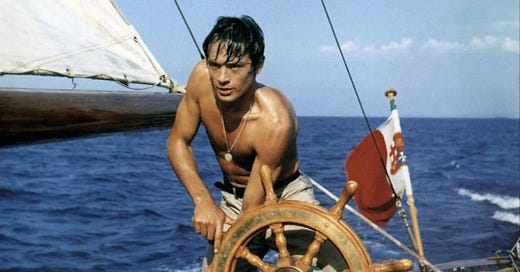Back in 1960, Films and Filming was one of a handful of British cinema magazines struggling in a market dominated by Sight and Sound - struggling, that is, until it featured on its cover a still from Plein Soleil, René Clement’s version of Patricia Highsmith’s The Talented Mr. Ripley, puzzlingly retitled for the English-language market Purple Noon.
The image chosen was on Alain Delon, bare-chested, at the wheel of the yacht whose owner he’d just murdered. His expression, far from remorseful, was a rakish and rascally glee, amplified for those who’d seen the film by their memory of the action that followed. Darting below, Delon mops off a buffed, bronzed torso, slips on one of his victim’s shirts and, in an ultimate gesture of triumph, tears into a ripe peach.
Sales soared of Films and Filming, on the subsequent covers of which Delon frequently featured. It wasn’t just that his virility exceeded that of such other jeunes premieres as Jean-Claude Brialy and Maurice Ronet, that he was more dashing than Jean Paul Belmondo and more soulful than Gerald Depardieu, but rather that he brought to every role the same guiltless arrogance with which he bit that peach. Here was the ultimate opportunist; a man it would always be unwise to trust.
Everyone has a favourite among his roles. These days, the fashionable choices are his films for Jean-Pierre Melville, in particular his monosyllabic assassin Jef in Le Samourai, or the languid sensualist in Jacques Deray’s steamy La Piscine (which Delon claimed he could no longer bear to watch, for its reminders of Maurice Ronet and Romy Schneider, both dead before their time.)
For me, his Tancredi in The Leopard will always have first place. Not only does it capture his youthful beauty at its height (swooningly celebrated by Visconti, with whom he was sexually involved at the time); the role might almost have been tailored to showcase his most winning quality, that glamorous amorality.
If I had to make a second choice, however, it would be the early and obscure 1964 Les Felins/Joy House, directed, again, by René Clement. One of those doomed Hollywood runaway productions that tried and, generally, failed to introduce French cinematic haute cuisine to the Coke-and-popcorn market of your neighbourhood multiplex, it matched him, unusually, with two American co-stars, the under-rated Lola Albright and a young Jane Fonda. Henri Decae’s monochrome lighting and Lalo Schifrin’s insinuatingly murmuring music match the shiftiness of Delon’s performance as a small-time hustler on the run along the Riviera from the mobster he has cuckolded. As in Plein Soleil, Clément makes him and not Fonda the pin-up.
At the obsequies for Jean-Paul Belmondo, president Emmanuel Macron celebrated “Bebel” as “the friend everyone wanted to have”. One would hardly say that of Delon, who was always dangerous to be around. Exceptionally among French actors, who are, by and large, a conventional group, his life off screen – one can scarcely call it “private” – parallelled that he played before the cameras. Affairs with Brigitte Bardot, Mireille Darc and, most famously, a protracted and finally suicidal train wreck of a relationship with Romy Schneider, alternated with a brief marriage, numerous liaisons and some contested parenthoods – not to mention his habit of surrounding himself with Yugoslavian leg-breakers, some of whom came to abrupt and unfortunate ends. All of these the tabloids knitted seamlessly into a biography where morality as most people know it was subject to constant redefinition.
Even in death he remains centre stage. The militant animal action group Thirty Million Friends is protesting his request that his favourite dog Loubu be put down and buried next to him and the other 35 hounds already interred on the grounds of his estate. One can imagine his glare at this news, and that sullen but oh so seductive pout.




